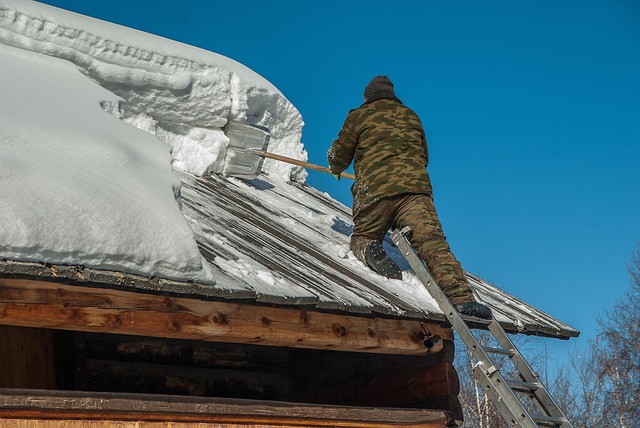Commercial snow removal services are essential for maintaining business operations during the winter season. A well-structured contract with a reputable snow plowing company is critical, detailing the scope of services, response times, and coverage areas post-snowfall. These agreements should account for the unpredictability of winter weather, with stipulations on the frequency and types of snow removal operations, including parking lots, walkways, and roadways. The contracts also include provisions for equipment maintenance, staffing, liability insurance, and clear communication protocols, reflecting the dynamic needs of commercial properties during severe weather conditions. Pricing models are designed to align with operational costs and peak demand periods, ensuring that both parties are prepared for all levels of snow events. Additionally, the contracts should specify minimum snow accumulation for service activation, the types of equipment used, and emergency call procedures outside regular hours. Payment terms, including costs, billing intervals, and dispute resolution mechanisms, are explicitly outlined to ensure a transparent and effective partnership throughout the winter months. Selecting a commercial snow removal company with a robust fleet and proactive clearing history is key to minimizing disruptions to your business operations and ensuring safety and accessibility even in harsh conditions. Advanced technologies and strategic planning, incorporating historical weather data and real-time forecasts, further enhance these services, guaranteeing consistent, high-quality snow plowing throughout the winter season.
Each winter, commercial properties face the challenge of maintaining safe and accessible areas amidst snowfall. This article delves into the intricacies of seasonal contracts for commercial snow plowing services, a critical aspect for businesses to ensure uninterrupted operations during the colder months. We explore the key elements to include in commercial snow removal service agreements, navigate the seasonal demands that affect commercial snow plowing operations, evaluate the top commercial snow removal companies for your business needs, and discuss strategic planning and risk management to optimize snow removal services. Understanding these contractual considerations is paramount for businesses to select the best commercial snow removal company and maintain operational continuity through the winter season.
- Navigating Seasonal Demands in Commercial Snow Plowing: An Overview of Contractual Considerations
- Key Elements to Include in Commercial Snow Removal Service Agreements
- Evaluating the Best Commercial Snow Removal Companies for Your Business Needs
- Strategic Planning and Risk Management for Seasonal Snow Plowing Operations
Navigating Seasonal Demands in Commercial Snow Plowing: An Overview of Contractual Considerations

Commercial snow removal services play a critical role in maintaining business operations during the winter months. Contractual agreements for these services must be carefully crafted to navigate the seasonal demands of snow plowing. A commercial snow removal company should anticipate and plan for the variability in snowfall patterns, which can range from minimal snow to significant winter storms. These contracts often outline the scope of services, including the frequency of plowing, the response time after snowfall, and the specific areas to be cleared. It’s crucial to establish clear guidelines on service expectations, as well as responsibilities related to weather monitoring and notification protocols. Additionally, the contract should detail the duration of the agreement, which typically runs from the start of the winter season to its end, ensuring that both the client and the snow removal provider are prepared for the full range of winter conditions. Seasonal contracts must also address terms for pricing structures, often based on volume or frequency of service, to align with the operational costs and resources required by the commercial snow plowing company during peak demand periods. Considerations such as equipment maintenance, staffing, and liability insurance should also be clearly outlined in the contractual agreement to ensure a smooth partnership throughout the winter season.
Key Elements to Include in Commercial Snow Removal Service Agreements

When engaging in a commercial snow removal service agreement, it’s crucial to delineate the scope of services provided by the commercial snow plowing company. Key elements to include ensure both parties have a clear understanding of responsibilities and expectations. The agreement should specify the geographic areas to be cleared, such as parking lots, walkways, and roadways adjacent to the commercial property. It’s important to outline the timeline for service commencement post-snowfall and the frequency of plowing and salt application. Additionally, the contract should detail the level of snow accumulation that triggers service, the types of equipment to be used, and the protocol for emergency or after-hours service requests. Clear terms regarding payment, including costs, billing cycles, and any late payment fees, should also be stipulated. To mitigate unforeseen circumstances, the agreement must include clauses related to weather thresholds that may alter service schedules, as well as procedures for dispute resolution. These provisions, when carefully crafted into a commercial snow removal service agreement, help ensure a smooth partnership between property owners and snow plowing companies throughout the winter season.
Evaluating the Best Commercial Snow Removal Companies for Your Business Needs

When the winter season looms large, ensuring your business remains accessible amidst snowfall is paramount. Evaluating the best commercial snow removal services requires a focused approach on reliability, efficiency, and responsiveness. A top-tier commercial snow removal company should possess a robust fleet of equipment, equipped with state-of-the-art snow plowing machinery capable of handling the demands of your property’s size and layout. Their expertise in preemptively clearing pathways, parking lots, and driveways ensures uninterrupted business operations during adverse weather conditions. It’s crucial to assess their history of service; a company with a proven track record of timely responses and effective snow management can significantly mitigate the risks posed by winter weather. Additionally, consider their capacity for scaling operations in line with the severity of snow events – a hallmark of a reliable commercial snow removal service. By carefully vetting companies on these criteria, you can select a partner that not only meets but exceeds your business’s snow removal needs. The right choice will offer peace of mind and unwavering support throughout the winter months, allowing your business to continue serving its customers without interruption.
Strategic Planning and Risk Management for Seasonal Snow Plowing Operations

Commercial snow removal operations play a critical role in maintaining business continuity during winter months. Strategic planning for such seasonal contracts involves a series of meticulous steps to ensure that when the first flakes fall, operations can transition seamlessly from routine to emergency mode. This preemptive approach includes assessing potential snowfall patterns, predicting peak snow periods, and determining resource allocation based on historical data and scientific forecasts. By analyzing past weather events and utilizing advanced weather prediction models, a commercial snow removal company can effectively plan its staffing, equipment deployment, and supply needs to meet the demand for services without overextending resources.
Risk management is an integral component of successful seasonal snow plowing operations. It involves identifying potential hazards, both environmental and operational, and implementing measures to mitigate their impact. A robust risk management strategy includes securing adequate insurance coverage, training employees on best safety practices, and maintaining a fleet of well-maintained equipment that can withstand the rigors of winter conditions. Additionally, a commercial snow removal service must stay abreast of local regulations and ensure compliance to avoid legal complications. By integrating technology such as GPS tracking for plows and real-time weather updates, these companies can enhance their operational efficiency, respond more swiftly to snow events, and deliver consistent, high-quality services throughout the season.




